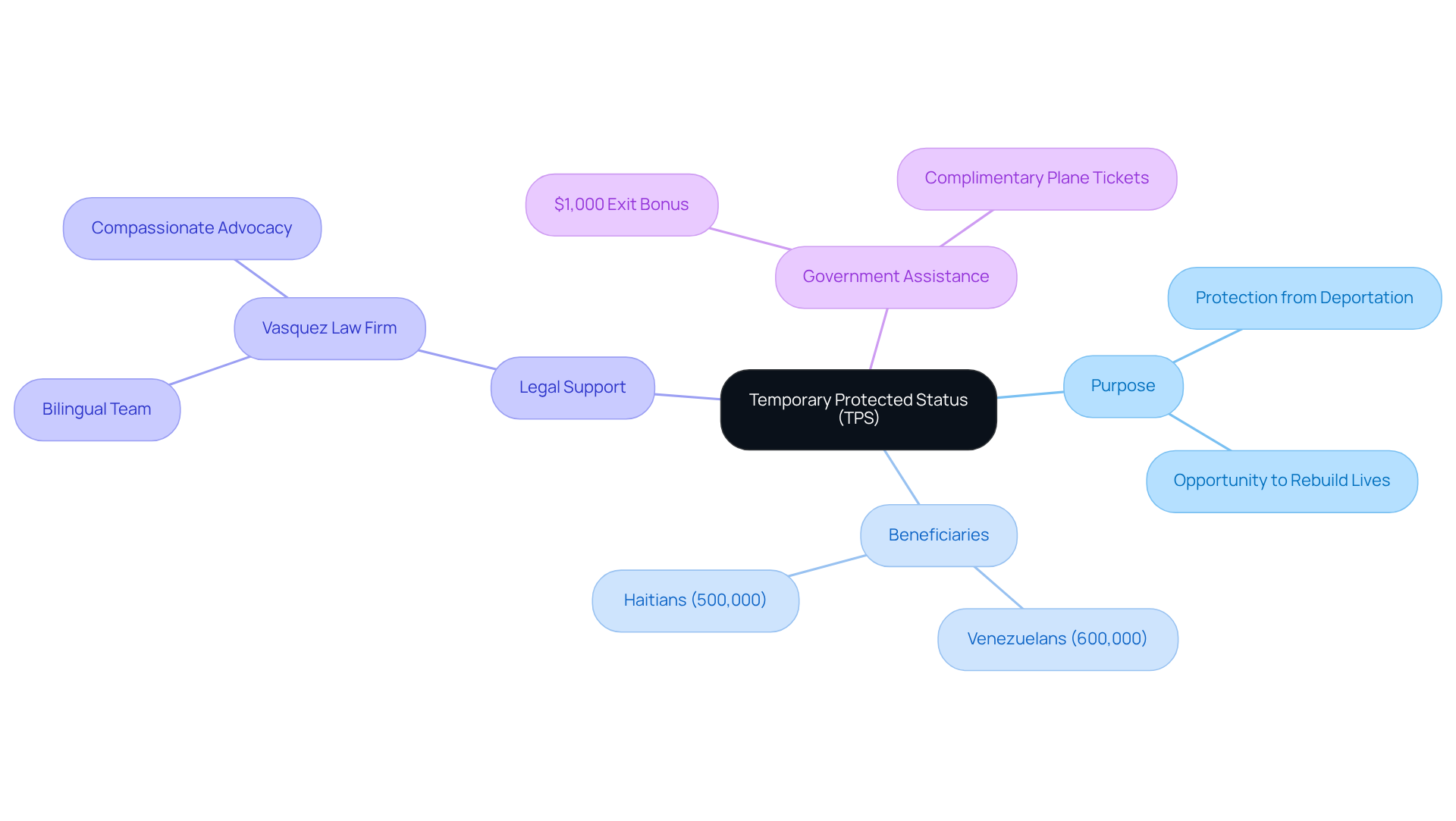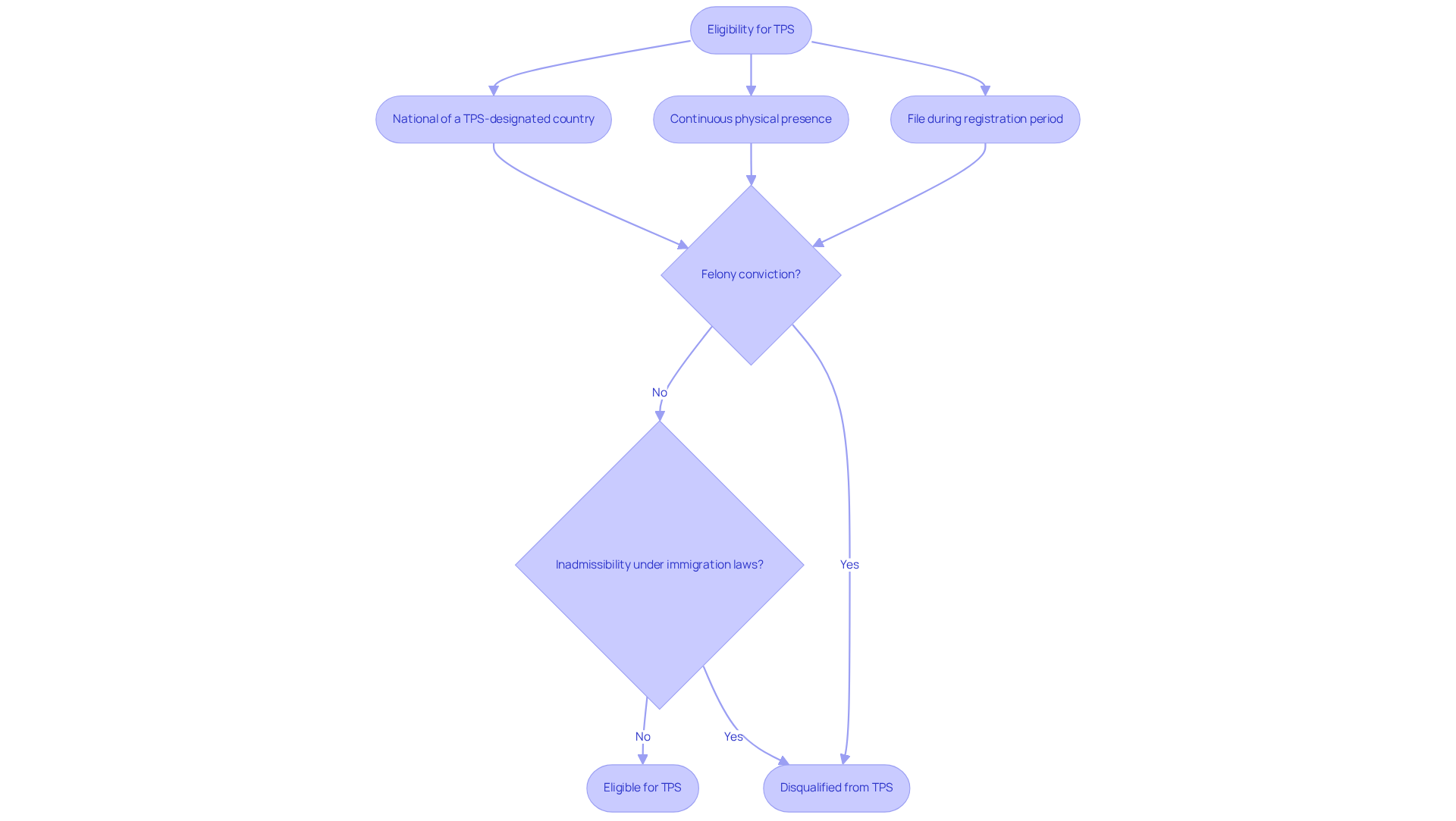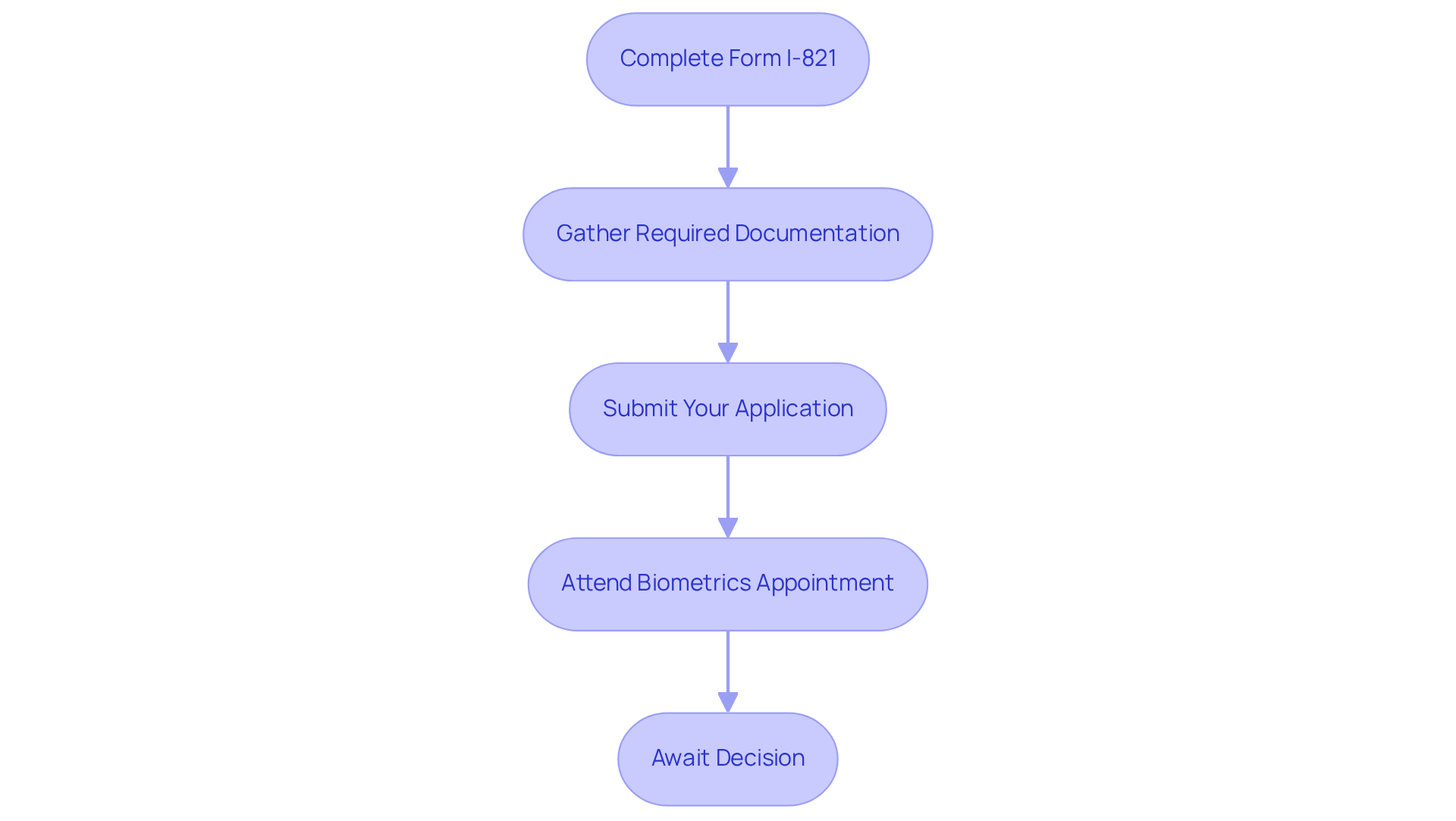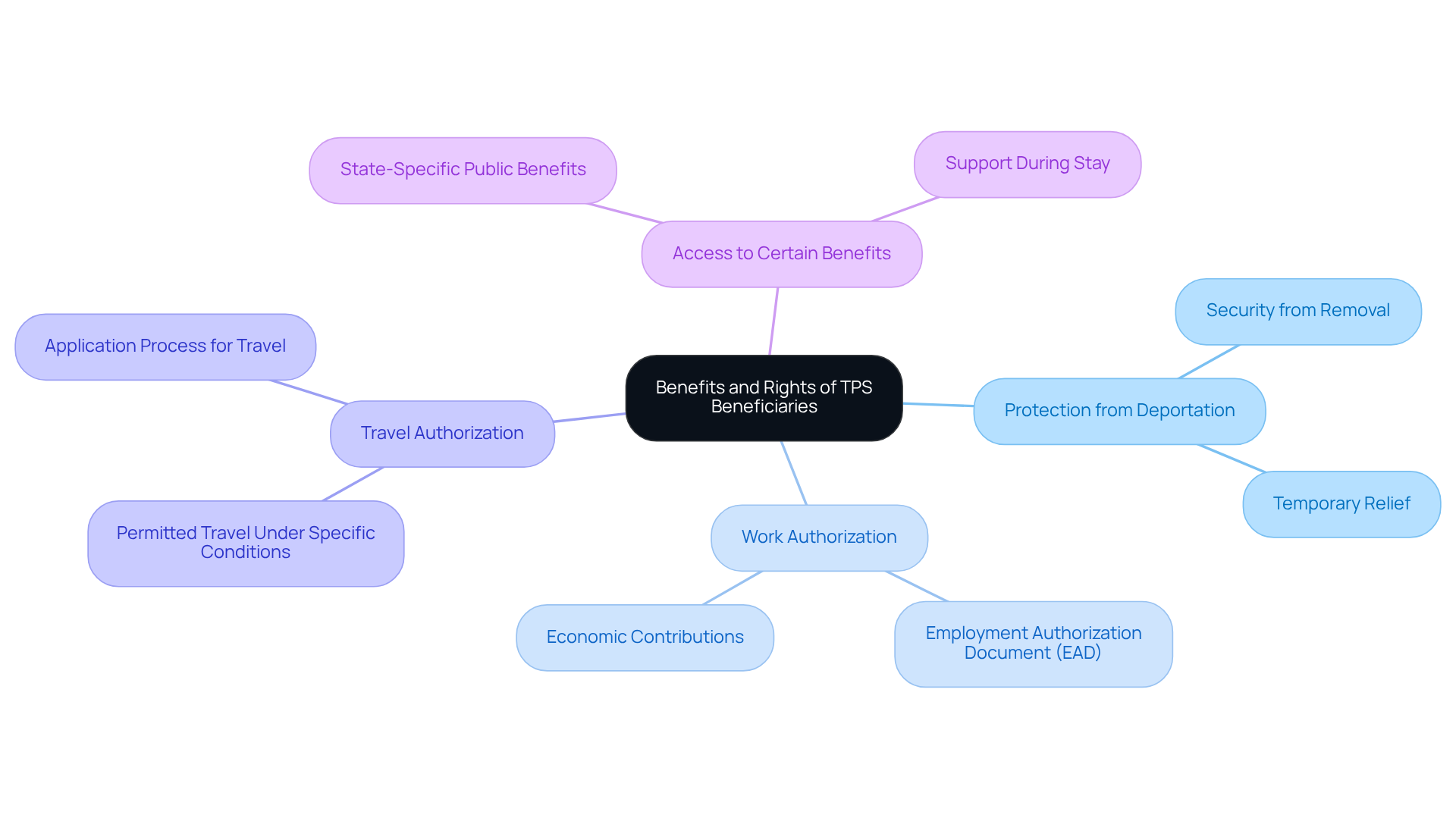Overview
Temporary Protected Status (TPS) in the U.S. is more than just a program; it is a compassionate response to the needs of individuals from countries facing armed conflict, environmental disasters, or other extraordinary conditions. It’s important to remember that TPS offers a vital lifeline, allowing these individuals to live and work in the U.S. while their home countries remain unsafe. This program serves as a critical safety net for vulnerable populations, providing not only protection from deportation but also hope for a better future.
You may be feeling overwhelmed by the challenges posed by your circumstances, but TPS is here to support you during these difficult times. It recognizes the struggles you face and offers a pathway to stability and security. By allowing you to contribute to society while you seek refuge, TPS embodies the nurturing spirit of our communities.
As you navigate this journey, remember that you are not alone. There are resources available to help you understand your rights and options. Seeking legal assistance can empower you to make informed decisions about your future. Together, we can work towards a brighter tomorrow, where safety and opportunity are within reach for everyone.
Introduction
Understanding Temporary Protected Status (TPS) is crucial for navigating the complexities of U.S. immigration, especially for those from nations facing turmoil, disaster, or violence. This humanitarian designation provides a lifeline to individuals in dire circumstances, allowing them to rebuild their lives in safety.
However, with changing eligibility criteria and application processes, you may be wondering:
- What does it truly mean to hold TPS in the U.S.?
- How can you secure this vital protection amidst ongoing uncertainties?
It's important to remember that you are not alone in this journey, and there are resources available to help you.
Define Temporary Protected Status (TPS) and Its Purpose
[Temporary Protected Status (TPS)](https://vasquezlawnc.com/es/areas-de-practica/inmigracion), que es el tps en estados unidos, is a humanitarian designation established by the government to assist nationals from specific countries facing ongoing armed conflict, environmental disasters, or other extraordinary conditions that prevent their safe return. The main goal of TPS, which is what que es el tps en estados unidos refers to, is to provide temporary protection from deportation, allowing individuals to live and work in the country while their home nations remain dangerous. It's important to recognize that as of 2025, approximately 600,000 Venezuelans and 500,000 Haitians benefit from TPS, lo que nos lleva a preguntarnos qué es el TPS en Estados Unidos, destacando su papel crítico en la protección de poblaciones vulnerables.
While TPS, or que es el tps en estados unidos, does not confer permanent residency or citizenship, it serves as an essential safety net, offering individuals the opportunity to rebuild their lives amidst adversity. At Vasquez Law Firm, we understand the complexities of immigration cases, and with over three decades of experience, we are dedicated to providing urgent legal guidance and compassionate advocacy for those navigating these challenging situations. Our bilingual team ensures that language is never a barrier to justice, empowering immigrant healthcare workers to understand their rights and take immediate action if they receive a subpoena or face immigration enforcement.
You may be feeling uncertain about your options, but it's reassuring to know that for those contemplating , the government offers a $1,000 exit bonus and complimentary plane tickets. This provides options for TPS beneficiaries amidst ongoing uncertainties. This program underscores the nation's commitment to humanitarian assistance, reflecting its values in supporting those in dire circumstances, similar to the principles of que es el tps en estados unidos. Together, we can navigate these challenges and ensure that you receive the support you deserve.

Identify Eligibility Requirements for TPS
To qualify for (TPS), which relates to que es el tps en estados unidos, it's crucial to understand the key criteria that applicants must meet. First and foremost, you need to be a national of a country designated for TPS or a person without nationality who last habitually resided in a TPS-designated country. Additionally, having been continuously physically present in the United States since the date specified by the Secretary of Homeland Security is essential.
Filing for TPS during the designated registration period is vital for maintaining your eligibility. It's also important to note that any felony conviction or two or more misdemeanors in the U.S. can disqualify you from TPS. Furthermore, you should not be found inadmissible under specific immigration laws, which encompass various grounds that could impact your status.
If primary evidence is unavailable, you can submit an affidavit explaining your efforts to obtain such documents. If you're concerned about the costs associated with filing for TPS, you may submit a fee waiver request using Form I-912.
These requirements are designed to ensure that TPS, que es el tps en estados unidos, is granted to individuals who genuinely need protection due to exceptional circumstances in their home countries. As of 2025, approximately 1.3 million people in the United States hold TPS, with many meeting these eligibility criteria. Real-life stories reveal the profound impact of TPS: countless beneficiaries have escaped armed conflict or humanitarian crises, finding safety and stability in the U.S.
Immigration attorneys stress the importance of understanding these criteria, as they can significantly influence your chances of securing TPS. If you have a pending Form I-821 or Form I-765, there's no need to refile your requests. Additionally, certain Employment Authorization Documents (EADs) are automatically extended through April 2, 2026, for re-registrants. Staying informed about updates to eligibility requirements is essential for those seeking this form of humanitarian relief. Remember, you are not alone in this journey, and support is available to help you navigate the process.

Explain the TPS Application Process and Required Documentation
Understanding que es el tps en estados unidos is crucial, as the application process for Temporary Protected Status (TPS) involves several critical steps, and it is essential to know your rights and seek immediate if needed.
- Complete Form I-821: This is the official request for TPS. Ensure that all sections are filled out accurately to avoid delays.
- Gather Required Documentation: Applicants must provide proof of nationality, evidence of continuous residence in the U.S., and any additional supporting documents specified by USCIS. This may include identification documents, proof of residence, and any relevant legal documents.
- Submit Your Application: Mail the completed Form I-821 along with the required documentation and the filing fee to the appropriate USCIS address. The fee for initial TPS registration is currently $500, plus a $30 biometrics fee.
- Attend Biometrics Appointment: If required, applicants will receive a notice to attend a biometrics appointment for fingerprinting and photographs, which is a standard part of the process.
- Await Decision: USCIS will evaluate the request and inform the applicant of the outcome. It is essential to keep copies of all submitted documents and respond promptly to any requests from USCIS to ensure a smooth process.
Statistics indicate that TPS programs have a high success rate, particularly for individuals from countries currently designated for TPS, such as El Salvador and Haiti. In 2025, Venezuelans, Salvadorans, and Haitians comprised the majority of TPS holders, totaling over 1.1 million beneficiaries. Real-world examples demonstrate that prompt and thorough submissions significantly enhance the chances of approval.
As noted by immigration experts, 'que es el tps en estados unidos' refers to Temporary Protected Status, which is a critical humanitarian tool that protects foreign nationals residing in the United States from deportation when conditions in their home countries make it unsafe to return. Consulting with immigration specialists, like those at Vasquez Law Firm, can offer further insights and guidance throughout the submission process. They offer free consultations and are available 24/7 for urgent legal matters, ensuring you have the support you need.
It is also important to note that applicants must notify USCIS promptly if their address changes after submitting their request. Furthermore, failure to secure travel authorization while a TPS request is pending can lead to denial of the TPS request and inability to reenter the U.S. Consequently, grasping and adhering to the procedure accurately is essential, and obtaining prompt legal advice can assist in safeguarding your rights during this vital period.

Outline Benefits and Rights of TPS Beneficiaries
Beneficiaries of Temporary Protected Status (TPS) enjoy several critical rights and benefits that significantly impact their lives in the U.S.:
- Protection from Deportation: TPS holders are shielded from removal based on their immigration status during the designated TPS period, providing them with essential security.
- Work Authorization: To understand que es el tps en estados unidos, it's important to note that TPS beneficiaries can apply for an Employment Authorization Document (EAD), enabling them to work legally in the U.S. This access to employment is vital, as TPS holders often contribute significantly to the economy, with many working in essential sectors.
- Travel Authorization: In specific circumstances, TPS holders may be permitted to travel outside the U.S. and return without jeopardizing their TPS status, although this requires careful navigation of the application process.
- Access to Certain Benefits: Depending on state laws, TPS holders may qualify for certain public benefits, which can provide additional support during their stay in the U.S.
These benefits collectively offer TPS holders a sense of security and stability as they navigate what que es el tps en estados unidos means for their immigration status. For instance, many TPS holders, like Wilna, a Haitian TPS beneficiary and community leader, advocate for their rights while balancing work and family responsibilities.
It's important to remember that recent updates indicate that holders of TPS, que es el tps en estados unidos, face ongoing challenges, including the risk of losing their status, which could lead to separation from jobs and families. Employment rates among TPS beneficiaries are generally higher compared to other immigrant groups, underscoring their integral role in the workforce.
You may be feeling uncertain about the future, and experts emphasize that while que es el tps en estados unidos provides , it does not create a pathway to permanent residency or citizenship. This highlights the need for legislative solutions to secure long-term stability for these individuals.
At Vasquez Law Firm, we understand the complexities faced by TPS beneficiaries. Our commitment to accessible legal representation means you can seek the justice you deserve without upfront costs. We work on a contingency fee basis for personal injury cases, ensuring that financial constraints never prevent you from obtaining quality legal support. With direct access to experienced attorneys who know your case intimately, and with our offices strategically located in Charlotte, Concord, and Huntersville in North Carolina, as well as in Florida, we are here to guide you through the legal landscape, providing the assistance you need to navigate your rights and benefits effectively.

Conclusion
Temporary Protected Status (TPS) stands as a vital humanitarian measure in the United States, offering essential protection and support for individuals from countries facing dire circumstances. By allowing nationals from designated countries to live and work in the U.S. without the fear of deportation, TPS embodies our nation’s commitment to providing refuge to those in need. This temporary safety net is crucial for many who seek stability and the opportunity to rebuild their lives amidst adversity.
It's important to understand the key aspects of TPS, including:
- Eligibility requirements
- The application process
- The benefits that accompany this status
For those seeking protection, grasping the criteria for TPS eligibility—such as nationality, continuous presence, and the importance of timely application—is essential. Additionally, the rights afforded to TPS beneficiaries, including work authorization and protection from deportation, underscore the program's significance in fostering a sense of security for individuals facing uncertainty.
As the landscape of TPS continues to evolve, you may be feeling overwhelmed. It is imperative for beneficiaries and potential applicants to stay informed and seek legal assistance when necessary. The ongoing challenges faced by TPS holders highlight the urgent need for legislative solutions that provide long-term stability and security. Engaging with legal experts can empower you to navigate the complexities of the immigration system and advocate for your rights effectively.
Remember, you are not alone in this journey. There are resources and individuals ready to support you every step of the way. Let’s work together towards a brighter future.
Frequently Asked Questions
What is Temporary Protected Status (TPS)?
Temporary Protected Status (TPS) is a humanitarian designation established by the U.S. government to assist nationals from specific countries experiencing ongoing armed conflict, environmental disasters, or other extraordinary conditions that prevent their safe return.
What is the main purpose of TPS?
The main purpose of TPS is to provide temporary protection from deportation, allowing individuals to live and work in the U.S. while their home countries remain unsafe.
How many people benefit from TPS as of 2025?
As of 2025, approximately 600,000 Venezuelans and 500,000 Haitians benefit from TPS.
Does TPS provide permanent residency or citizenship?
No, TPS does not confer permanent residency or citizenship; it serves as a temporary safety net for individuals facing dangerous conditions in their home countries.
What support does Vasquez Law Firm offer for TPS cases?
Vasquez Law Firm provides urgent legal guidance and compassionate advocacy for those navigating immigration cases, with a bilingual team to ensure language barriers do not hinder access to justice.
What options are available for TPS beneficiaries considering voluntary departure?
For those contemplating voluntary departure, the government offers a $1,000 exit bonus and complimentary plane tickets.
What does TPS reflect about the U.S. government's values?
TPS reflects the U.S. government's commitment to humanitarian assistance and support for individuals in dire circumstances.




